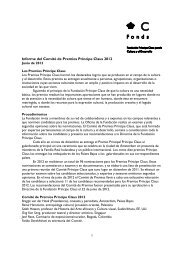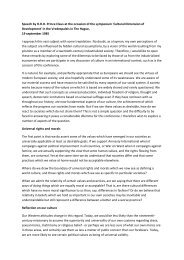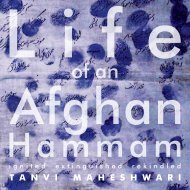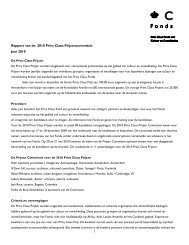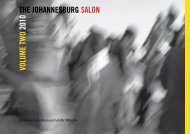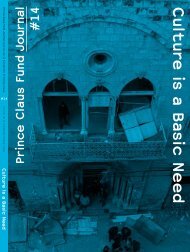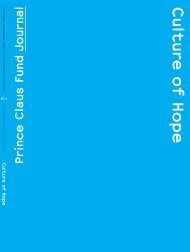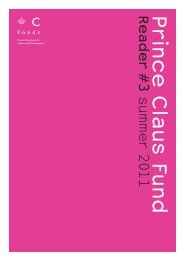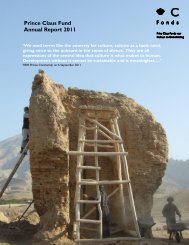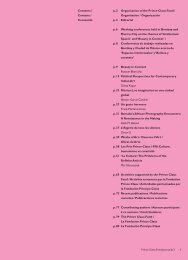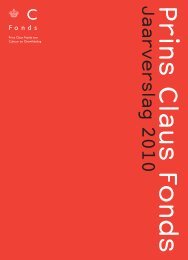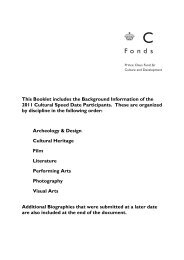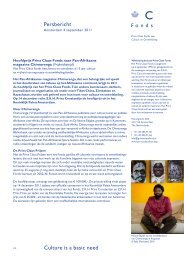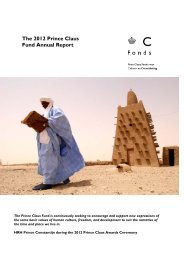30r364 boek.qxd:awards book 11 - Prince Claus Fund
30r364 boek.qxd:awards book 11 - Prince Claus Fund
30r364 boek.qxd:awards book 11 - Prince Claus Fund
Create successful ePaper yourself
Turn your PDF publications into a flip-book with our unique Google optimized e-Paper software.
Writer, Woman, Activistby Supriya ChaudhuriDoes the day break at the sound of guns?No!It breaks at the cry of that bird!Nirmal Prabha BordoloiIndira Goswami quotes these lines from an Assamese poet in speaking of her own involvementin the peace process in India’s turbulent north-east. They epitomise her status as a creativewriter of exceptional force and originality who has never doubted the capacity of literature tochange the world, and has never shirked her own responsibility towards it. Writing both in hernative Assamese and in English, often translating her own work from one language to the other,Indira Goswami, better known as Mamoni Raisom Goswami, is not only one of the most distin -guished authors of fiction, literary history and social critique in contemporary India, she is alsoan activist and public intellectual who has initiated dialogue with outlawed insurgent groupsand furthered the movement towards peace in our time.Characteristic of her work is the extent to which it is fuelled by her life, and conversely, thelife by the work: both have become exemplary in a way that must be unique anywhere. Her novelsdraw upon her own life-experiences and go beyond them to produce a literature rooted in the body,in the flesh, in the physical world, yet able to express what can only remain unvoiced, unspoken,in the body. Some of this personal history, that of a gifted young woman, widowed after eighteenmonths of marriage and remaking her life as a scholar, a teacher, a writer, an intellectual, isfrankly opened up to us in what she herself calls An Unfinished Autobiography. But the richestsource of our understanding of Indira Goswami’s life and creative identity is her literary work:the novels, the short stories, the poetry. This body of work communicates the unresolved tensionsand ambiguities of a distinctive, gendered, Indian modernity. The writer, born in 1942, is a witnessnot only to the nation’s birth but also to its tormented subsequent history, struggling to reconcileregion and nation, religion and caste, gender and community.Indira Goswami began writing short stories at an early age, but her novels came out of theexperiences of maturity. As a scholar researching the lives of widows in Vrindavan, a place ofVaishnavite pilgrimage where Hindu widows lead lives of pious destitution, she learnt of the selfimposedprivations and sacrifices of the Radheshyamis, devotees of Lord Krishna who save upfor a ritual cremation, only to be robbed of even that satisfaction. The novel that emerged from thatexperience, The Shadow of the Dark God (1976) combines acute sociological analysis with an extra -ordinary sense of individual pain, desolation and loss. In a much later work, possibly her master -piece, The Moth-Eaten Howdah of the Tusker (1988), Indira Goswami returned to the lives of Brahminwidows in a Vaishnavite satra of southern Kamrup in Assam, again drawing upon her own experi -ences, but this time of childhood and adolescence. Written in the dialect of the region, the noveldemonstrates the capacity of great art to transform the local into the universal. Set in India’sremote north-east, just after the Second World War, it explores the uneasy incursions of modernitythat unsettle an apparently ‘timeless’ agrarian culture and the unchanging rhythms of orthodoxreligion, bringing pain, violence and self-awakening to the novel’s characters, especially to itswomen. In its depiction of individual passion and suffering, the conflicts between peasants andfeudal landlords, a corrupt priesthood and caste oppression, within a layered, intricate social can -vas and through haunting, unforgettable images, the novel bridges the gap between the popular andthe canonical work of art. It was made into an award-winning film, Adahya, by Santwana Bordoloi.322008 <strong>Prince</strong> <strong>Claus</strong> Awards



